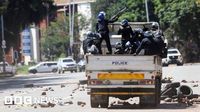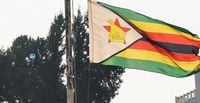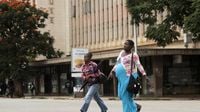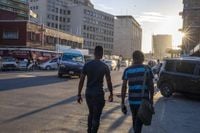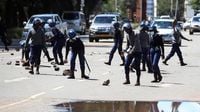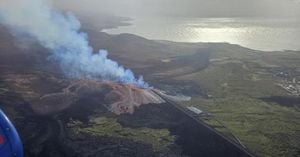HARARE, Zimbabwe. March 31, 2025 — A national protest meant to pressure President Emmerson Mnangagwa to resign turned into a near-total shutdown across Zimbabwe as citizens largely opted to stay home. Major urban centers like Harare and Bulawayo were eerily quiet, with businesses shuttered and schools closed as the public heeded government appeals to avoid the protests.
The protests were initiated by a faction of disgruntled war veterans from the ruling ZANU-PF party, who accused Mnangagwa of corruption and attempting to extend his rule beyond 2028, when his second and final term is set to end. Despite the calls for action, the anticipated mass mobilization failed to materialize, with only a handful of protesters participating in the planned demonstrations.
In the capital, police presence was heavily intensified, with officers deployed to patrol the streets and set up roadblocks. On the outskirts of the central business district, authorities dispersed a small crowd with teargas. The police had previously encouraged citizens to carry on with their daily activities, stating on X, "feel free to embark on their day-to-day activities." However, the atmosphere was anything but normal.
The protest was led by Blessed Geza, a former senior member of ZANU-PF who has recently become a controversial figure. Known as Comrade Bombshell, Geza has gained popularity through his YouTube addresses, rallying support for an uprising against Mnangagwa. He has called for Vice President Constantine Chiwenga to replace the 82-year-old president, who has been criticized for his authoritarian governance style.
On social media, Geza urged Zimbabweans "not to be cowards," despite the low turnout. He has expressed frustration over Mnangagwa's alleged plans to cling to power, which have sparked fears of a constitutional crisis. The slogan "2030 he will still be the leader" has circulated among Mnangagwa's supporters, even though Zimbabwe's constitution limits presidential terms to two five-year terms.
Political analysts have pointed out that while the turnout was low, it still represented a significant political statement. Ibbo Mandaza, a political scientist, remarked, "The shutdown was a massive political statement," suggesting that the economic paralysis could send a message to those in power.
Geza's faction, consisting of veterans of the 1970s liberation war, has accused Mnangagwa of betraying the values they fought for. The war veterans had previously supported Mnangagwa but have now turned against him, expressing their disillusionment with his leadership. They are reportedly backing Chiwenga, who has yet to publicly comment on the protests or the calls for him to assume the presidency.
Amid the protests, the atmosphere in Harare was tense. Streets that would typically be bustling with vendors and traffic were deserted. A petrol station attendant described the situation as one of fear, stating that ordinary people did not want the country to slide into civil war. The clergy has also urged calm, warning that unrest could destabilize an already fragile nation.
Geza's rise to prominence has been swift, with tens of thousands tuning in to his online addresses. However, the police have labeled him a treason suspect and are reportedly hunting him down. The ZANU-PF party has expelled him, further complicating his position.
Mnangagwa, who took power in 2017 following a coup against long-time leader Robert Mugabe, has consistently denied any intentions to extend his presidency. He has promised democratic reforms but faces criticism from both local and international human rights groups who accuse him of continuing the repressive tactics of his predecessor.
As the day unfolded, videos circulated on social media showing police using teargas on protesters gathered at President Robert Mugabe Square. One protester, a 63-year-old woman on crutches, voiced her frustrations, saying, "I am taking care of my grandchildren because my children cannot afford to. We want General [Constantine] Chiwenga to take over." This sentiment reflects the broader discontent among citizens who feel neglected by the current administration.
Despite the government's assurances of peace and safety, the reality on the ground painted a different picture. Businesses barricaded their premises in anticipation of unrest, while many residents chose to stay indoors to avoid potential clashes with the police.
As the protests faded into a shutdown, the political landscape in Zimbabwe remains fraught with uncertainty. The calls for change, while met with resistance, highlight the growing discontent among citizens and the potential for further unrest if the government fails to address their concerns. The situation is a stark reminder of the delicate balance between authority and the will of the people in a country still grappling with the legacy of its past.
